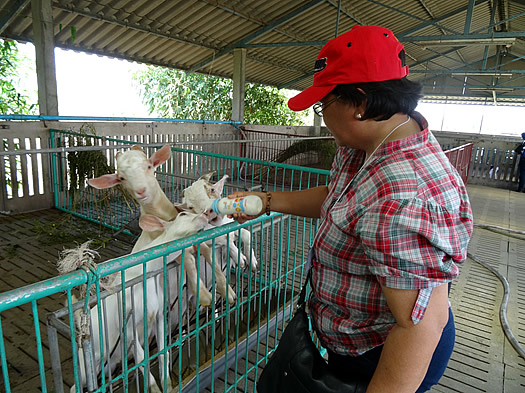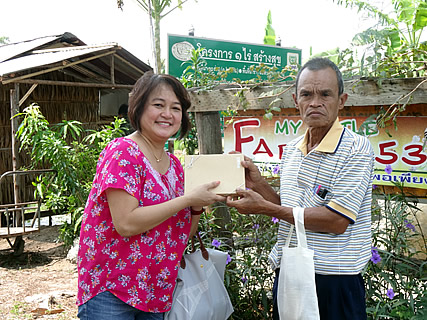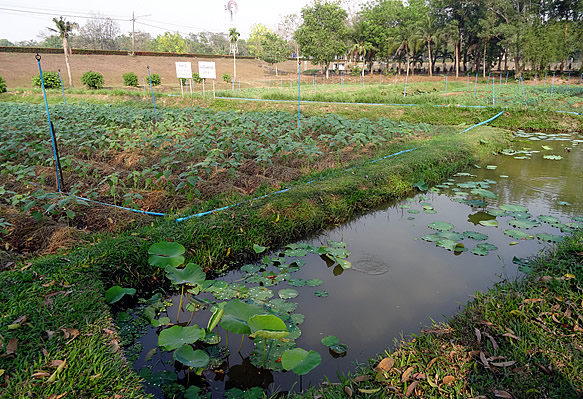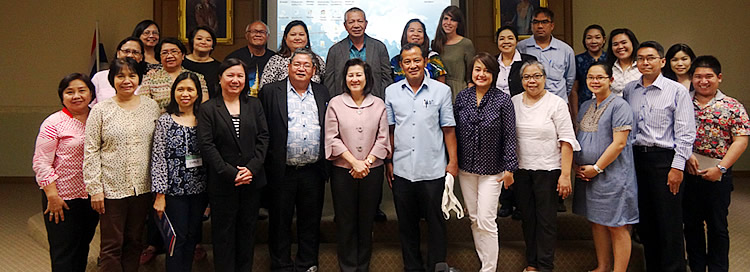Their visit is the second of three overseas study missions on climate change adaptation and mitigation (CCAM) initiatives in agriculture that the Southeast Asian Regional Center for Graduate Study and Research in Agriculture (SEARCA) has organized in collaboration with the International Center for Tropical Agriculture (CIAT) Regional Office for Asia based in Hanoi; and for this run, DoA Thailand as local partner. CIAT is also the lead center for the Consultative Group on International Agricultural Research (CGIAR) Research Program on Climate Change, Agriculture and Food Security (CCAFS). The study missions aim to enhance the managerial and technical capacity of the DA Adaptation and Mitigation Initiatives in Agriculture (DA AMIA) Teams and Focal Persons on climate change and is part of the component on Capacity Building of the DA Project on Strengthening Implementation of AMIA, being implemented in partnership with SEARCA.
According to Dr. Margaret Yoovatana, Senior Policy and Plan Specialist, DoA, Thailand has more than 50 Climate Smart Agriculture (CSA) projects funded by His Majesty King Bhumibol Adulyadej. They focus on the following: 1) conservation and rehabilitation of water reservoirs and resources; 2) soil amelioration practices; 3) income generating livelihood programs; 4) sufficiency economy; 5) socio agro-forestry; 6) reforestation; 7) diversification (New Theory Farming in Agriculture -30:30:30:10). She added that His Majesty (HM) King Bhumibol involved himself personally in projects geared towards agriculture and rural development.
In Bangkok, the group visited Her Royal Highness Princess Maha Chakri Sirindhorn’s 55th Royal Celebration Garden, a Learning Center for HM the King’s New Theory in Agriculture. The theory is based on the division of the agricultural land of each rural household, which averages 10 to 15 rai (=1.6 ha to 2.4 ha), into four zones according to use in the proportion of 30:30:30:10. This New Theory of Farming in Agriculture allocates 30 percent for digging a pond to store 19,000 cubic metres of water for cultivation in the dry season and to raise fish; 30 percent for rice cultivation sufficient for year-round home consumption; 30 percent for other crops and fruit; and 10 percent for housing, raising livestock and other activities.
 In Ang Thong Province, the Study Mission Team visited Her Majesty Queen Sirikit’s Model Farm, which serves as a training center for the unemployed, farmers, and flood victims on new agricultural farming methods such as vegetable gardening, paddy rice production, mushroom production, goat raising etc., teaching them the importance of producing and storing sufficient food as well as producing high quality products for the market.
In Ang Thong Province, the Study Mission Team visited Her Majesty Queen Sirikit’s Model Farm, which serves as a training center for the unemployed, farmers, and flood victims on new agricultural farming methods such as vegetable gardening, paddy rice production, mushroom production, goat raising etc., teaching them the importance of producing and storing sufficient food as well as producing high quality products for the market.
The group met Mr. Somchai Samarntrakun, Chairman of the Koiroottakwa Golden Land Community, which is a Muslim Community in Nong Chok District. His farm has been recognized as a Sufficiency Learning Center. Here, Mr. Somchai offers free training on renewable energy and biodiesel production, livestock farming, composting, integrated farming and small scale food processing. Apart from serving as a study center, the community also offers a homestay service for interested visitors. The model farm is in itself the practical application of the “Sufficiency Economy” of His Majesty King Bhumibol, which places “humanity at the centre, focuses on man’s well-being rather than wealth, makes sustainability the very core of the thinking, understands the need for human security, and concentrates on building people’s capabilities to develop their potential.”
 In Chachoengsao Province, the Study Mission Team toured the Khao Hin Son Royal Development Study Center, one of the six Royal Development Study Centres established by HM the King. The Center is considered a model of sustainable agricultural development managed by the Land Development Department under the Ministry of Agriculture and Cooperatives. Likewise, it serves as a training center and demonstration farm highlighting case studies of HM the King’s pioneering work on agricultural research and development, appropriate farming technologies, sustainable use of water resources, conservation, organic farming, flood and drought mitigation, and 30:30:30:10 principle of “new theory” farming.
In Chachoengsao Province, the Study Mission Team toured the Khao Hin Son Royal Development Study Center, one of the six Royal Development Study Centres established by HM the King. The Center is considered a model of sustainable agricultural development managed by the Land Development Department under the Ministry of Agriculture and Cooperatives. Likewise, it serves as a training center and demonstration farm highlighting case studies of HM the King’s pioneering work on agricultural research and development, appropriate farming technologies, sustainable use of water resources, conservation, organic farming, flood and drought mitigation, and 30:30:30:10 principle of “new theory” farming.
Meanwhile, participants learned about Thailand’s flood protection and management program, advanced radar system, and flood forecasting tools during their visit to Bangkok Metropolitan Administration (BMA). According to Mr. Vichai Somboon, Project Planning Expert, BMA Department of Drainage and Sewerage, following the aftermath of the 2011 worst flood in the history of Thailand, the government has started implementing flood protection improvements/measures which include dredging of main canals, repairs of flood walls, and elevating of flood walls along rivers and dikes. The group also toured the wastewater treatment plant of BMA.
 Next, the group met with Dr.Didier Lesueur of the French agricultural research for development center, CIRAD. He discussed land use changes in different parts of Thailand over the years and the use of “biochar,” a pure form of charcoal, to improve soil fertility. Biochar has been found useful in mitigating climate change.
Next, the group met with Dr.Didier Lesueur of the French agricultural research for development center, CIRAD. He discussed land use changes in different parts of Thailand over the years and the use of “biochar,” a pure form of charcoal, to improve soil fertility. Biochar has been found useful in mitigating climate change.
The group capped their study mission with an exit conference before DDG Waraporn Prompoj of DoA-Thailand, where the participants representing the Philippine Coconut Authority, Philippine Crop Insurance Commission, Rice Watch and Action Network, DA-AMIA, and SEARCA presented briefly about their respective institutions. (Rosario B. Bantayan)
